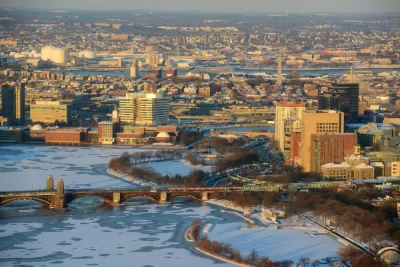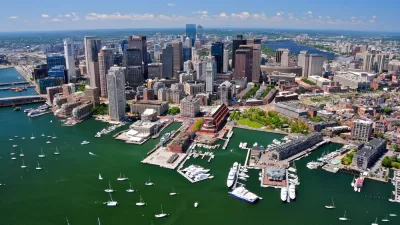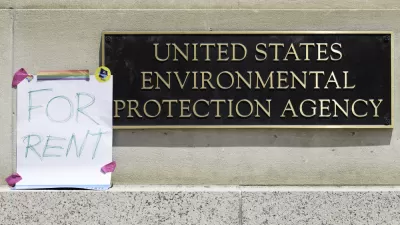The Boston Foundation published the “Inaugural Boston Climate Progress Report” earlier this month. Other U.S. cities should follow their lead.

Boston is one of the first U.S. cities to assess its progress toward achieving net zero emissions by 2050, with the publication of the “Inaugural Boston Climate Progress Report” by the Boston Foundation earlier this month. The 2050 net zero goal is in line with the recommendations of the United Nations International Panel on Climate Change published earlier this year.
The report, co-authored by Planetizen blogger Joan Fitzgerald along with Michael J. Walsh, answers the question: “How well is Boston—as a civic community—driving forward system transformations to meet climate, resilience, and equity goals?” To do so, the report “highlights a dozen key outcomes that must be achieved by programs, projects, and initiatives whose success is imperative to reaching the overarching goals, and lays out four ‘big lifts,’ system-transforming actions which Boston—along with the broader region and state—needs to accelerate to sharply reduce net emissions,” according to the Boston Foundation’s website for the report.
“Progress snapshots” for each of the key outcomes and can be explored at the links below:
Key Outcomes
- Low Carbon Electricity
- Electrified Mobility
- Equitable Housing and Mobility
- Electric and Efficient Buildings
- Greater Integration of Energy Systems
- Targeted and Modest Use of Fossil and Alternative Fuels
- Sustainable Waste Management
- Responsible Carbon Dioxide Removal
- Robust and Resilient Urban Forests
- Protection of the Coastline
- Preparation for Extreme Weather
- Repair of Past Harms
The report describes the four big lifts as “multidecade, multi-platform projects that would play critical roles in helping the city align with its climate and equity goals.”
Big Lifts
- Big Lift #1: Retrofitting Small Building Stock
- Big Lift #2: Local Energy Planning for an Electrified City
- Big Lift #3: Building a Resilient Coastline Through Improved Governance
- Big Lift #4: Prioritize Reparative Planning for Boston’s Frontline Neighborhoods
For its part, Boston will face unique challenges while making progress toward the net zero goal. The city reduced greenhouse gas emissions by 21 percent between 2005 and 2019, according to the report, but the Brookings Institution ranked Boston as the most unequal U.S. city in 2014.
Even with a long way to go to turn this wish list into a series of accomplishments, Boston is poised for a leadership role in the climate crisis. When organized into this kind of conceptual framework, the challenge of reducing emissions and preparing for the disruptions to come seems doable, even if still immensely challenging.
FULL STORY: Inaugural Boston Climate Progress Report

Maui's Vacation Rental Debate Turns Ugly
Verbal attacks, misinformation campaigns and fistfights plague a high-stakes debate to convert thousands of vacation rentals into long-term housing.

Planetizen Federal Action Tracker
A weekly monitor of how Trump’s orders and actions are impacting planners and planning in America.

San Francisco Suspends Traffic Calming Amidst Record Deaths
Citing “a challenging fiscal landscape,” the city will cease the program on the heels of 42 traffic deaths, including 24 pedestrians.

Defunct Pittsburgh Power Plant to Become Residential Tower
A decommissioned steam heat plant will be redeveloped into almost 100 affordable housing units.

Trump Prompts Restructuring of Transportation Research Board in “Unprecedented Overreach”
The TRB has eliminated more than half of its committees including those focused on climate, equity, and cities.

Amtrak Rolls Out New Orleans to Alabama “Mardi Gras” Train
The new service will operate morning and evening departures between Mobile and New Orleans.
Urban Design for Planners 1: Software Tools
This six-course series explores essential urban design concepts using open source software and equips planners with the tools they need to participate fully in the urban design process.
Planning for Universal Design
Learn the tools for implementing Universal Design in planning regulations.
Heyer Gruel & Associates PA
JM Goldson LLC
Custer County Colorado
City of Camden Redevelopment Agency
City of Astoria
Transportation Research & Education Center (TREC) at Portland State University
Jefferson Parish Government
Camden Redevelopment Agency
City of Claremont





























